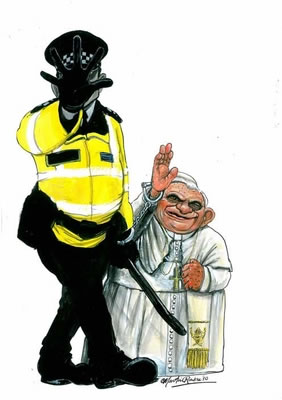 While Richard Dawkins and Christopher Hitchens’ eye-catching move to indict the Pope before the International Criminal Court may be unlikely to succeed, it does touch on a much broader issue – the Catholic Church’s troubled relationship with the very idea of international law.
While Richard Dawkins and Christopher Hitchens’ eye-catching move to indict the Pope before the International Criminal Court may be unlikely to succeed, it does touch on a much broader issue – the Catholic Church’s troubled relationship with the very idea of international law.
When, in 2005, the ICC issued arrest warrants for the leaders of Uganda’s brutal Lords Resistance Army, local Catholic clergy were quick to denounce the move as a threat to peace, and (without a hint of irony) a “western” imposition. Since then, the Archbishop of Gulu, Jean-Baptist Odama, has led a vociferous campaign against the indictment of LRA leader Joseph Kony, whose crimes include, as it happens, the large-scale sexual enslavement of children.
Odama continues a long tradition. After the Second World War, a Vatican bishop, Alois Hudal, organised safe passage for hundreds of war criminals, including Adolf Eichmann, the architect of the Holocaust.
When genocide ravaged Rwanda in 1994, Catholic authorities did more than stand idly by. Local priests not only participated in the killings, but were actively reassigned by the Church to parishes in Europe after the genocidal government fell. When the International Criminal Tribunal for Rwanda issued an arrest warrant for Athanase Seromba – who had shot a number of Tutsis and ordered the bulldozing of a church where thousands more were sheltering – the Italian government initially refused to honour it, reportedly under Vatican pressure.
Amid international outrage, Seromba was eventually persuaded to hand himself in. Eichmann, too, was ultimately captured, despite Hudal’s best efforts. But Uganda’s Joseph Kony continues to kill his way across Central Africa.
Kony’s relationship with the Church is long and complex. In 2000, Catholic leaders helped persuade the Ugandan government to offer a blanket amnesty to any LRA fighter who laid down their arms. While this prompted many low-level defections, Kony showed little interest – continuing to abduct children and carry out killings, despite repeated overtures from the bishops.
In 2003, the Ugandan government lost patience, and referred the LRA to the newly-formed ICC. Arrest warrants were issued two years later. The following month, the group announced its readiness to talk peace – while demanding that the warrants be dropped. Yet despite years of protracted negotiation, sponsored by Church leaders, there has been no respite to Kony’s brutality.
Most damning of all are suggestions that the Church’s efforts have actually worsened the conflict. In 2007, the ICC warned that food aid supplied to the LRA by the Catholic relief agency Caritas was being sold on to buy weapons. In 2008, the UN reported that the LRA had used money from the peace talks to move beyond Uganda and transform itself into a regional fighting force.
The Catholic Church’s dispute with the ICC highlights a clash between modern principles of international law and the political role the Church sees itself playing in Africa. The Court’s founding precept is that victims’ rights can never be negotiated away – and that peace built on the denial of justice is unlikely to last. This represents a radical turn, perhaps especially in Africa, where blanket amnesties have often been the norm – with victims able to hope, at best, for a “reconciliation” ceremony, essentially Christian in character, managed and overseen by local religious leaders. In seeking to defend its turf, the Catholic Church has again found itself shielding the perpetrators of crimes which “shock the conscience of humanity”.
No matter whether Dawkins and Hitchens succeed, their action brings welcome scrutiny of the Church’s murky relationship with the rule of law, and its repeated failure to protect those most vulnerable. Morally, if not legally, there is a clear case to answer.

